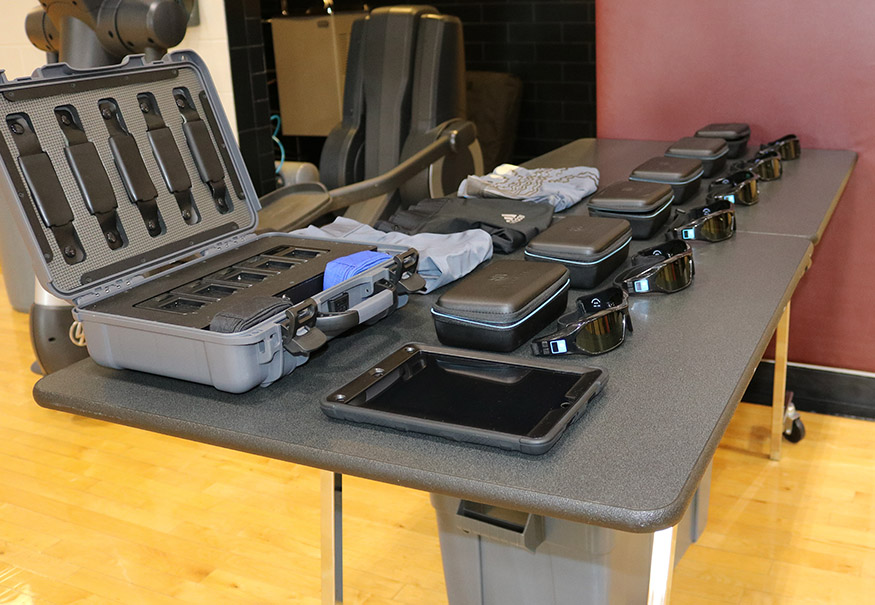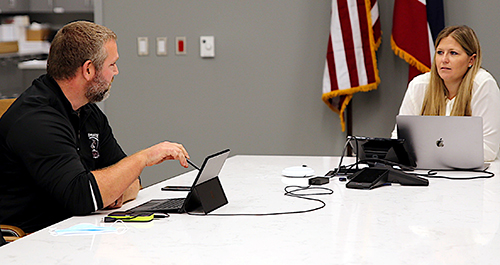News at the HPC²
MSU’s CAVS Researchers, EMCC’s Communiversity Partner to Study Wearable Technology in Industry Settings
November 5, 2020
Sensors in wearable clothing and accessories are increasingly being used to improve performance in athletes and provide new insights. Mississippi State and East Mississippi Community College are partnering to study the potential benefits of wearable technology in industry settings.
Photo by Amanda Meeler
Photo by Amanda Meeler
A team from MSU with representation from the university’s James Worth Bagley College of Engineering, National Strategic Planning and Analysis Research Center, and Center for Advanced Vehicular Systems is working with EMCC Communiversity Director Courtney Taylor on the National Science Foundation-funded project. With $120,000 in funding, the team will conduct several focus groups to better understand how various industry stakeholders perceive wearable technology. This technology includes sensors that are worn by a user and transmit data about their movements and other physiological indicators such as heart rate.
The project builds on similar work that was conducted by MSU’s Athlete Engineering research team, which focused on how strength and conditioning coaches perceive wearable technology in sports settings. Reuben Burch, associate director of human factors and athlete engineering at MSU’s Center for Advanced Vehicular Systems, said the team will be using the technology acceptance model to study potential benefits and drawbacks in industrial settings.
“With the industrial athlete, the biggest stigma is that ‘big brother’ is watching,” Burch said. “How are employers and managers going to use this data? Some companies say that they don’t see a way to overcome this stigma. Others acknowledge it might be tricky but value the potential efficiencies that could come from it. Culturally, you have a wider variety of perceptions of wearables in industry than you do in sports, where they have been more commonly used and accepted.”
Taylor, who works closely with Golden Triangle industry leaders as part of her role at EMCC, said wearable technology has proven useful for contact tracing during the COVID-19 pandemic, something few would have been talking about just a year ago.
“In the industrial setting, as COVID is proving, we really don’t know where tomorrow is going to take us,” Taylor said. “This gives us the opportunity to work with local industry partners to look at this technology and find out what people are truly saying about it instead of just assuming people are going to be scared and anxious about it. It also helps industry understand what challenges they are going to face.”
The researchers primarily will be focusing on areas such as manufacturing, logistics, and warehousing. One commonality with many jobs in these sectors is repetitive motion, which can create muscular skeletal disorders, Burch said. Companies can use wearable technology to train personnel to perform a task in a way that reduces injury risk, which keeps employees on the job.

Reuben Burch, associate director of human factors and athlete engineering at MSU’s Center for Advanced Vehicular Systems, and EMCC Communiversity Director Courtney Taylor discuss wearable technologies with area industry leaders during a virtual meeting held this summer.
Photo courtesy of EMCC
Photo courtesy of EMCC
“The most important thing is we provide data analysis tools,” Ball said. “We can take the data, analyze it, transform it and put it into actionable results. Instead of getting raw data streams, we can give you information on how risky a movement is.”
NSPARC will assist in developing and carrying out the focus group sessions using the center’s facilities. Shane Warren, research project manager at NSPARC, said the focus groups will include a wide range of people who would potentially interact with wearables, from human resources personnel, purchasing decision makers, and employees wearing the devices.
Lesley Strawderman, professor and International Paper Chair in MSU’s Department of Industrial and Systems Engineering, is serving as a co-principal investigator on the grant, along with Burch, Ball, and Taylor.
For more on MSU’s Athlete Engineering research group, visit https://www.cavs.msstate.edu/research/athlete_engineering.php.
MSU is Mississippi’s leading university, available online at www.msstate.edu.
By James Carskadon
